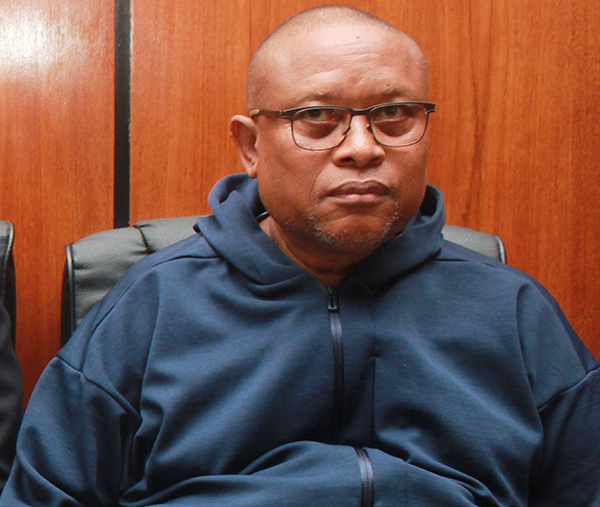Roland Routh
Former fisheries minister Bernhardt Esau has pleaded ignorance about the crimes he is accused of as well as the industry he was leading, at least initially.
He said he knew absolutely nothing about any conspiracy to defraud the government, or about the offences committed, and also told the court that he was used by his co-accused.
He further said that given a chance, he will provide evidence pertaining thereto. “My name and credentials as minister of fisheries and marine resources have been opportunistically and falsely optimised by some of my co-accused,” Esau claimed.
He said this yesterday during his and Nigel van Wyk’s first day of hearing in their bail application on new facts before Oshakati-based High Court acting Judge David Munsu.
He revealed that he knew absolutely nothing about the fisheries sector when he was thrown in at the deep end as minister in 2010. “I was a blank,” he said, adding that he knew nothing about the procedures and workings of the ministry, and had to undergo an “induction.”
Esau, who made a name for himself as a trade unionist, became a member of parliament in 1995. In 1999, he became deputy minister of trade and industry. In 2010, he was promoted to fisheries minister – a portfolio he held until November 2019 – when he was forced to resign in the wake of the Fishrot scandal.
Lamenting his misfortune because of his continued incarceration, Esau told the court that he suffered stock theft at his farm, break-ins at his farmhouse and his house in Swakopmund, as well as trouble with the Namibia Revenue Authority (NamRA).
With regards to the renovations done at his farmhouse and Windhoek residences, which the State alleges was done with Fishrot money, the accused explained that the renovations were done with funds he generated through bonds and pensions as a politician and member of parliament.
Furthermore, he was running a highly-productive “weaner production” operation at his farm which brought in substantial profits.
The labels attached to him such as “fraudster, racketeer, thief and criminal” has hurt him very much, he said, as he always lived his life according to a moral compass that did not tolerate dishonesty.
He further told the judge that he only needs to be able to talk to his accountants to prove to the State that he was never part of a conspiracy to defraud the government, and that he was used by his co-accused. Esau and Van Wyk are charged alongside former justice minister Sacky Shanghala, former National Fishing Corporation of Namibia (Fishcor) CEO Mike Nghipunya, former Investec Namibia (now Ninety-nine) CEO James Hatuikulipi, his nephew Tamson Hatuikulipi, former Namgomar Pesca Namibia director Ricardo Gustavo, Pius Mwatelulo, Otneel Shuudifonya and Phillipus Mwapopi with several counts of fraud, racketeering, money laundering, contravening the Anti-Corruption Act, theft, tax evasion and their alternatives.
It is alleged that they conspired to change the fisheries law to give unfettered access to Namibia’s rich fishing resources to international fishing conglomerate Samherji from Iceland in exchange for bribes of millions of Namibia dollars.
Esau alone is facing two counts of racketeering, four counts of money laundering, 10 counts of corruptly using his office for gratification for himself or others, five counts of fraud, one count of theft, one count of tax evasion and conspiracy to commit fraud.
It is alleged that he benefitted a minimum of N$5.4 million from the Fishrot scandal. He signed the memorandum of understanding with his Angolan counterpart Victoria de Barross, which paved the way for him to award fish quotas to Namgomar, the State is alleging.
-rrouth@nepc.com.na



